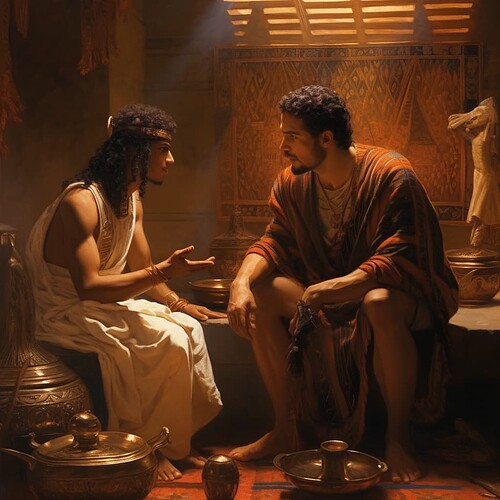 January 24: Genesis 39-40: Joseph in Potiphar’s House and the Interpretation of Dreams
January 24: Genesis 39-40: Joseph in Potiphar’s House and the Interpretation of Dreams
From Trials to Trust: Joseph’s Journey in Egypt
 Introduction
Introduction
In today’s study, we explore Genesis chapters 39 and 40, where we witness Joseph’s remarkable resilience and faith amid trials. From being sold into slavery to interpreting dreams in prison, Joseph’s journey exemplifies unwavering trust in God.
 Genesis 39: Joseph in Potiphar’s House
Genesis 39: Joseph in Potiphar’s House
Joseph, sold into slavery, serves in the house of Potiphar, an Egyptian official. His diligence and God’s favor lead to his rise as the overseer of the house. However, a false accusation from Potiphar’s wife lands him in prison.
Key Verse: “The Lord was with Joseph so that he prospered, and he lived in the house of his Egyptian master.” — Genesis 39:2
 Genesis 40: The Interpretation of Dreams
Genesis 40: The Interpretation of Dreams
In prison, Joseph interprets the dreams of Pharaoh’s cupbearer and baker. His accurate interpretations demonstrate God’s presence in his life, even in the darkest situations.
Key Verse: “Do not interpretations belong to God? Tell me your dreams.” — Genesis 40:8
 Key Themes and Reflections:
Key Themes and Reflections:
Resilience in Adversity: Joseph’s journey from Potiphar’s house to prison highlights resilience and maintaining integrity in the face of injustice.
Divine Presence and Guidance: Despite his circumstances, Joseph remains aware of God’s presence, guiding and blessing him.
Gift of Interpretation: Joseph’s ability to interpret dreams underscores his spiritual insight and God’s favor in empowering him with wisdom.
 Today’s Application:
Today’s Application:
Reflect on how to maintain faith and integrity in challenging circumstances. Recognize that God’s presence can guide us through trials. Consider how God can use our gifts, like Joseph’s interpretation of dreams, to fulfill His purpose.
 Hidden Gem:
Hidden Gem:
Did you know? Joseph’s time in Egypt sets the stage for the eventual fulfillment of God’s promise to Abraham, Isaac, and Jacob, linking Joseph’s personal story to the broader narrative of Israel’s history.
 Reflective Q&A:
Reflective Q&A:
![]() Genesis 39: Joseph in Potiphar’s House
Genesis 39: Joseph in Potiphar’s House
![]() Integrity Amid Trials: How does Joseph’s conduct in Potiphar’s house and his response to temptation reflect on his character?
Integrity Amid Trials: How does Joseph’s conduct in Potiphar’s house and his response to temptation reflect on his character?
A: Joseph’s unwavering integrity, even in private moments, exemplifies his deep commitment to righteousness and trust in God. His refusal to succumb to temptation showcases his moral strength and loyalty to God’s principles.
![]() God’s Favor in Hardship: What can we learn from Joseph’s experience about finding God’s favor in difficult circumstances?
God’s Favor in Hardship: What can we learn from Joseph’s experience about finding God’s favor in difficult circumstances?
A: Joseph’s story teaches that God’s favor does not always shield us from hardship, but it can provide strength, wisdom, and opportunity within those challenges, turning trials into testimonies.
![]() Genesis 40: The Interpretation of Dreams
Genesis 40: The Interpretation of Dreams
![]() Interpreting God’s Messages: How does Joseph’s gift of interpreting dreams relate to understanding God’s messages today?
Interpreting God’s Messages: How does Joseph’s gift of interpreting dreams relate to understanding God’s messages today?
A: Joseph’s ability to interpret dreams reminds us that God can communicate in various ways. It encourages us to seek spiritual discernment and remain open to God’s guidance, whether through scripture, prayer, or other means.
![]() The Role of Spiritual Gifts: How do spiritual gifts, like Joseph’s dream interpretation, play a role in God’s plan?
The Role of Spiritual Gifts: How do spiritual gifts, like Joseph’s dream interpretation, play a role in God’s plan?
A: Spiritual gifts are tools God uses to advance His purposes. Like Joseph, using our gifts responsibly and humbly can impact lives and align us more closely with God’s overarching plan.
 Join the Discussion:
Join the Discussion:
How do Joseph’s experiences in Genesis 39-40 resonate with your personal faith journey? Share your insights and reflections in the comments below!
#Joseph #Integrity #Faith #SpiritualGifts #BibleStudy #GenesisJourney
![]() See You Tomorrow in Genesis: Continue exploring the richness of Genesis. Join us as we delve into the unfolding events in Joseph’s life and their significance in the grand biblical narrative.
See You Tomorrow in Genesis: Continue exploring the richness of Genesis. Join us as we delve into the unfolding events in Joseph’s life and their significance in the grand biblical narrative.
 Join the Forum!
Join the Forum!
Deepen your understanding and connect with others in our AIgniteScripture Community. From vibrant discussions to valuable resources, we offer a space for everyone’s spiritual growth:
Free Members: Participate in discussions and access an array of biblical resources. Sign up here: https://forum.aignitescripture.com/join
Supporters Membership ($20/month or $200/year): Get exclusive content, personalized newsletters, and special forum access. Influence our community and shape its direction.
